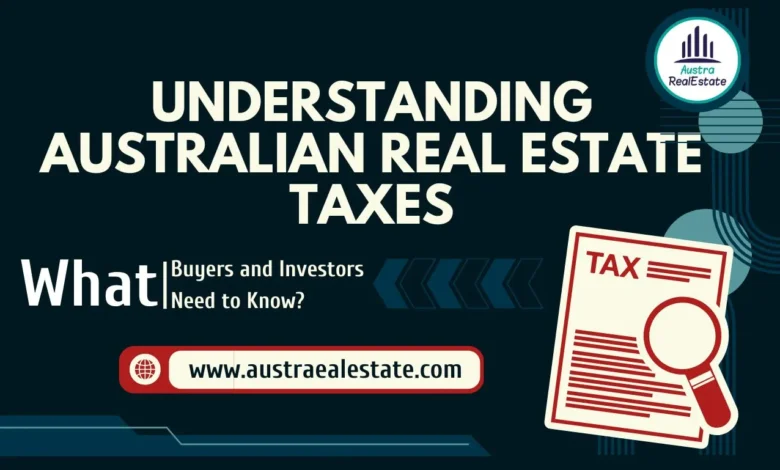What You Need to Know about Australian Real Estate Taxes?

How to Navigate Australian Taxes in Its Property Market: taxes advice for Buyers and Investors
Here you will find all about Australian real estate taxes advice.
Up to last financial year, the Australian property market had never experienced such a remarkable rise in median property prices; up 70% on previous peaks. As such, it comes as no surprise that this boom has been noticed by buyers and investors looking to make the most of the growth. But, before we go too far down the rabbit hole, let me just flag that there are a number of taxes you may also need to consider when it comes to buying or investing in Australian real estate.
Capital Gains Tax (CGT) is one of the largest tax burdens you will come across, but, it also has some very big implications for your property investment purse. More on CGT and other taxation that might impact the returns gained from your investments.
Capital Gains Tax (CGT)?
Capital Gains Tax (CGT) is a tax payable by you on the profit that you make from selling an asset, like an investment property.
In Australia, capital gains tax is calculated on the difference between purchase price and selling price, with allowable deductions such as legal fees and repairs.
The CGT is charged at your marginal rate of tax, therefor the more you earn, the higher the % of tax you pay on your capitals gains. It is important for residential and commercial property investors to understand how CGT works.
Short-Term vs. Long-Term Capital Gains Tax
Short-term & long term capital gains: An analysis of CGT
If you buy and sell a property within 12 months: The gain is taxed at your marginal income tax rate (short-term capital gains tax). This short-term CGT owes to the typically higher brackets that see a chunk of your profits you had expected diminish.
Long-Term Capital Gains Tax: If you hold onto your property for over 12 months before selling, you may be entitled to a 50% CGT discount. The new legislation could make long-term property investing more attractive from a tax point of view, since the exemption has the potential to substantially lower your taxable gains.
Different Taxes by Home Buyers and Investors
CGT is not the only tax you will need to pay when buying or investing in property. Some other important taxes that can affect your investment are:
1. Income Tax on Rental Income
Rental income If you earned rental income from your properties it is taxable in the year it is received and needs to be declared to the Australian Taxation Office (ATO). But you might be able to lower your taxable income by taking deductions for things like:
- Property management fees
- Maintenance and repair costs
- Mortgage interest
- Insurance premiums
- The building, heating systems or appliances part of the depreciation
These deductions can make a big difference in terms of how much tax you owe on your rental income.
2. Stamp Duty
Stamp duty is one of the biggest expenses for property investors in Australia. It is levied by each state and territory on the purchase price of a property, with the rate subject to variation depending upon which state or territory that you are purchasing your property. This could be the stamp duty charged for one state, New South Wales compared to another Victoria or Queensland.
Ensure to check the stamp duty rates in the state where you are planning to invest before buying.
3. Depreciation Deductions
Investors might also be able to claim the depreciation against their own taxable income You can then claim a depreciation deduction for the decline in value of the property and its plant or equipment over time. They reduce your taxable income which can help with cash flow and make the investment more lucrative.
Australian Property Investors Taxation Benefits
Australia has many tax concessions for long-term property investors. These include:
- Depreciation: How much is the tax deduction for claiming depreciation on the building and assets in the property.
- Beneficial Tax Treatment of Divdends and Long-Term capital gains: Some types of investment income, such as qualified dividends and long-term capital gain, are taxed at a lower rate which means that more of your returns get to stay in your pocket.
Looking Ahead — Taxes and Investment Strategy
Whether you are a novice or seasoned investor, it is equally important to grasp the tax landscape. By understanding how CGT, income tax and stamp duty operate, you can anticipate your tax obligations in order to take the proper steps up front to potentially achieve greater investment returns.
Please do not make any real estate or investment purchase without first seeking professional tax or accounting advice. Australian tax rules are complicated, an experienced accountant can help you to implement the correct approach for your needs and circumstances.
Conclusion
The Australian real estate market is one of the best in the world, which presents great opportunities for both buyers and investors. But they need Need to Know about Australian Real Estate Taxes.
Rely on our financial advisers to source tailor-fitted tax strategies and guide you in making an informed choice with regards to either growing long-term capital or managing a rental property.



